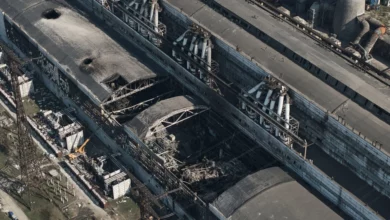
There has been “an unprecedented collapse” in business across the eurozone this month as EU countries impose severe restrictions on movement to slow the coronavirus, according to indicators released Tuesday.
The PMI survey by analysis company IHS Markit confirmed what economists and governments had been bracing for: a dramatically abrupt tumble into a certain recession.
But the figures were even worse than many had expected.
The provisional data showed a slump in activity in the 19-nation eurozone in March “far exceeding that seen even at the height of the global financial crisis,” IHS Markit said in a statement.
Its PMI index for this month dived to 31.4 points — the lowest since it started its survey in 1998.
A reading below 50 points indicates a contraction. In February, the index had stood at 51.6.
Major economies Italy, France, Germany and Spain are all deeply affected and have implemented severe social and business restrictions to try to slow the virus’s spread, by keeping potential carriers at home.
The eurozone’s economic struggle was worsened by some EU member states closing off their borders to neighbors, limiting the flow of goods and people within the single market.
EU countries are starting to deploy massive state spending and loan guarantees to prop up businesses and employment, with the EU dropping its strict rules on budget deficits. But that mitigation effort is yet to be felt.
– Pessimism –
The IHS Markit survey showed the services sector was being pummelled the worst, sliding to well below where it was at during the 2009 global financial crisis.
Manufacturing was also hit, supply chains were being badly degraded, and there was “a record fall in export business as cross-border trade flows seized up”.
Employees are being let go at the fastest rate since June 2009.
IHS Markit noted “record degrees of pessimism about the year ahead seen in both manufacturing and services”.
“Clearly there’s scope for the downturn to intensify further as even more draconian policies to deal with the virus are potentially implemented in coming months,” its chief economist Chris Williamson said.
Economic analysis firm Capital Economics said the PMI collapse was “so sharp that at any other time it would look like a spreadsheet error”.
It said “April’s data could be even worse”, predicting the eurozone’s 2020 first-quarter GDP could plunge by at least three percent from the last three months of 2019.
“That would be similar to the sharpest quarterly fall in GDP during the global financial crisis,” it said.
The startlingly bad PMI indicator heaped more pressure on eurozone finance ministers, who were to meet via videolink later Tuesday to consider coordinated ways to blunt the economic fall-out from the pandemic.
– ‘Ground to a halt’ –
Analysts at bank ING said the IHS Markit survey “paints a picture of an economy that has ground to a halt”.
But while it demonstrated the wide and sudden impact of the coronavirus, it “doesn’t tell us much about the depth of the decline”.
ING added: “It’s still anyone’s guess how deep this actually is.
“The question is how much policy makers can soften the blow. Perhaps most relevant is how much unemployment and bankruptcies can be avoided to determine the possible steepness of a recovery.”
Berenberg Economics chimed in by saying that “the short-term hit to GDP from the coronavirus recession will most likely be more severe than the initial phase of the financial crisis”.
It noted a similar dive in Britain, which was never part of the eurozone and is no longer an EU member, whose PMI index slumped from 53.0 last month to 37.1 this month.
It also said the eurozone collapse echoed what was seen in China last month when the pandemic that started there bit deepest. China’s economy, it noted, was showing tentative signs of recovery.
Another economic analysis firm, Pantheon Macro, said it expects businesses are “eyeing a gradual improvement starting at some point in Q2 (the second quarter)” but warned that if the slump extended into that period, it would be “bad news”.
Even with a slight amelioration in view, companies were “aggressively” cutting staff, which meant unemployment figures in the next few month “won’t look pretty”.
Image: AFP / Odd ANDERSEN Limits on cross-border movement have worsened the economic impact




